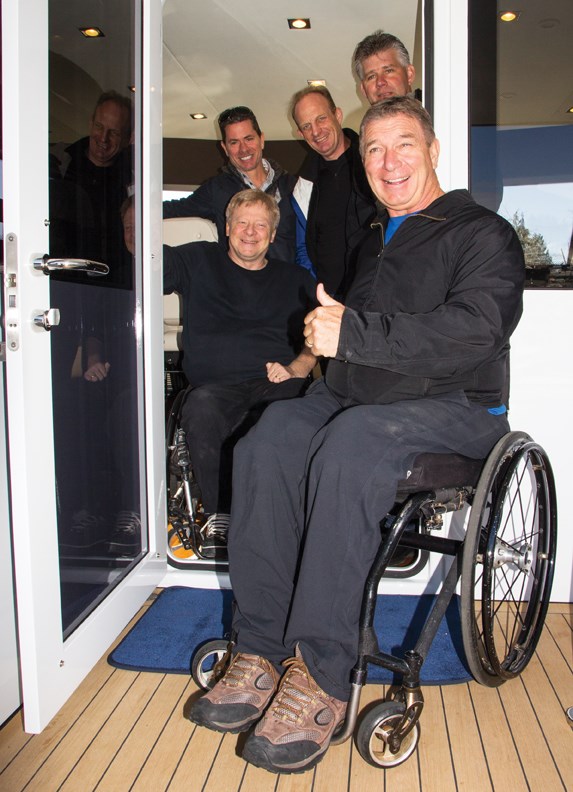Canadian icon and disabilities advocate Rick Hansen gave Coastal Craft a ringing endorsement for their new, wheelchair-accessible, 65-foot Concord yacht after taking a tour on March 26.
“This is incredible, to see a yacht that has been built with such great quality,” Hansen said. “It’s always inspirational to be able to see something that’s a work of art and – in many ways – a great source of pride for British Columbia.”
Hansen made the trip into Gibsons with Brad McCannell – vice president of access and inclusion for the Rick Hansen Foundation – where they met with the team from Coastal Craft for a tour of the yacht.
Part of McCannell’s job is to look for design flaws in anything labelled handicapped accessible, but he said he was hard-pressed to find anything wrong.
“It’s fabulous – the finish is unbelievable – but more impressive to me is that they’ve done a lot of research and they’ve done it properly,” McCannell said. “They haven’t just done a knee-jerk – throw an elevator in or put a lift on the side of the boat. It’s really, really well thought out.”
Fred Lachlan, marine sales manager in the Americas region for Volvo Penta, was also on the tour to showcase the yacht’s IPS drive system – a joystick controller near the stern of the yacht, capable of docking the vessel.
After getting out on the water, Hansen was able to skipper the boat back into the harbour and dock it, using the IPS drive.
“Just because one has a disability doesn’t mean you can’t modify an environment like this, remove the barriers and unleash ability,” Hansen said. “Boating is still a way of life and a possibility. I see this boat as an inspiration and a symbol for a new, emerging industry and opportunity for boating and outdoor recreation – not only in B.C. – but around the world.
“Aging baby boomers and their parents, they’re having many disabling conditions,” Hansen said. “Hopefully the message gets out that just because you have some challenges doesn’t mean you can’t get out and be tourists or boaters and be fully engaged in all that this beautiful earth has to offer.”
Everything down to the height of the tables, McCannell said, was a nearly seamless integration of accessibility and elegance.
“It’s the way that they’ve kept the integrity of the user all the way through this thing. You’re not giving up anything. It’s beautiful,” McCannell said. “I guess the next step is to scale it down. Can you do this on a 35-foot boat? This is fabulous, this is great, but if you could get this down to a 35-foot boat level – not exactly this access but this kind of design, this kind of integrity – it would change the boating world.”
Hansen and McCannell both said the yacht’s three elevators impressed them – especially the exterior wheelchair lift, a prototype designed by Coastal Craft for this yacht to offer wheelchair access from virtually any dock in the world, on both the port and starboard sides of the boat.
“As a person of disability, you can be on this boat, get on this boat, interact with this boat and maintain your dignity,” McCannell said. “Other applications will use a davit to swing the wheelchair out – like a little crane – and haul you in. You look like a sack of potatoes. There’s no dignity in that.”
Coastal Craft owner Jeff Rhodes said the elevators proved to be the most challenging part of building the $5-million yacht.
“They were new, and obviously there were safety considerations that we had to address first,” Rhodes said. “Then it was aesthetically fitting it into the look and feel of the boat and not impacting the spaces negatively. It was always going to be a compromise of some kind, but we think we’ve achieved our goal in that the yacht still functions for everyone else on board as well as the owner in the wheelchair.”
The main elevator connects all three decks of the yacht, from the upper deck to the stateroom with en suite bathroom.
“If you think of the stats, by 2030 one in five Canadians will have a disability,” Hansen said. “A lot of people think that this is a charitable or human rights issue that you have to address, but it’s also more than that – it’s a converging economic opportunity and as more and more people with disabling conditions come into the Canadian mainstream, it will have profound business applications.
“Those business operators who see the opportunity – the first adopters and first responders – they’re going to be uniquely positioned to benefit in the long term, over the next 20 years. This is the beginning of a wakeup call for Canada and hopefully a new opportunity.”
After extensive comparisons with American yacht manufacturers, an American couple – one of whom is in a wheelchair – commissioned the yacht, which was first launched in January after almost a year of construction.
The couple will eventually move the yacht to Bailey Island, Maine. But before that, the two are planning a trip to Gibsons where they will use their new boat to explore the waterways of the Sunshine Coast.



